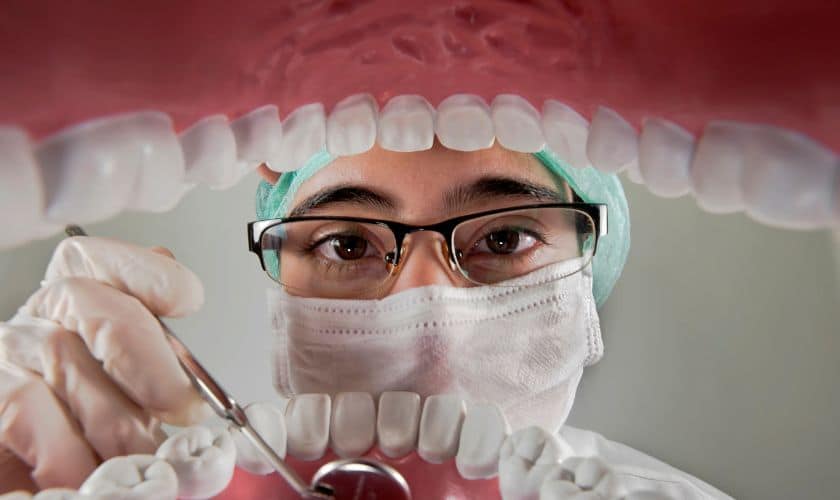Many folks feel nervous about having their teeth checked. This is especially true if you need to undergo oral surgery, such as a tooth extraction. As there are several myths about oral surgeries, it’s understandable why so many people are apprehensive about dental procedures. By understanding the truth behind these myths, you will be better prepared for when you visit your dental clinic.

Myth #1: Oral surgery is only for the most extreme, complicated cases
While oral surgery can address extreme cases, such as severe dental injuries from an accident, oral surgery also encompasses several common dental procedures, such as wisdom tooth extraction. This very common procedure is performed on millions of people each year.
Myth #2: All oral surgeries are super painful
Thanks to advancements in anesthesia and pain management, many procedures involve little to no pain. Before you undergo any dental surgery, your oral surgeon will consult with you first, so they can 1. understand your concerns, and 2. explain the methods of pain management, such as general anesthesia and sedation.
Myth #3: All oral surgeries are tooth extractions
While oral surgery encompasses many tooth extractions, such as wisdom teeth extraction and removal of broken or rotting teeth, there are other dental procedures beyond these. For example, there are corrective jaw surgeries for improper or painful bites, biopsies to check for cancer, and bone grafts (replacing missing bone in the jaw.)
Myth #4: All oral surgeries are super invasive
While some oral surgeries are complex and invasive, other oral surgeries are minimally invasive. This is due to cutting edge technologies, such as laser dentistry, with lasers being less invasive while offering precise applications. For example, dental lasers can be used for periodontal treatment and soft tissue procedures. In addition to being less invasive, laser treatments cause less discomfort, less bleeding, and offer faster healing.
Myth #5: Dental implants are just for beauty purposes
While dental implants can restore aesthetics, dental implants actually improve your oral health. How so? When a real tooth is missing, the jawbone and gums beneath can begin to deteriorate, as there is no tooth nerve to simulate the bone and surrounding tissue. This process, called bone resorption, can happen quickly. But with a dental implant, the screw of the implant serves as a “root” that stimulates the jaw and gums, which discourages bone resorption.
Myth #6: Oral surgery is for adults, children don’t need such procedures
Children may require oral surgery. For example, trauma from accidents that affect the teeth and jaw may require an oral surgeon to resolve the damage. And children with cleft palate (an opening or gap at the roof of the mouth), undergo palatoplasty, a common oral surgery, to close the gap.
Myth #7: The recovery process after oral surgery is long and painful
The recovery process varies depending on the type of surgery involved. Many patients, however, can resume normal, everyday activities shortly after oral procedures. As always, follow post-operative care steps and contact your oral surgeon if you have any questions or concerns.
Myth #8: Tobacco products don’t interfere with post-surgical results
Use of tobacco products increases the risk of infection and delays healing. How so? Nicotine restricts blood vessels, which means less oxygen and blood flow to surgical sites. This in turn causes impaired bone healing, which is especially problematic for bone grafts and dental implants. In fact, studies show that tobacco use causes higher risk of implant failure and gum issues. For best post-surgical outcomes, avoid tobacco use of any kind.
Myth #9: Elderly folks cannot undergo oral surgery
Some individuals believe the elderly cannot receive oral surgery due to age-related complications. As with any medical procedure, medical professionals assess each patient’s health to determine the exact care the patient requires. If needed, elderly individuals can undergo oral surgery. For example, an elderly individual with missing teeth needs dental implants to 1. prevent further jawbone deterioration, and 2. have improved quality of life, with dental implants functioning like a real tooth (provides efficient chewing.)
Oral Surgery: Makes Your Best Smile Possible and Optimizes Dental Health
With the use of cutting-edge technology (such as lasers) and advancements in pain management (different anesthesia options), oral surgery is far less painful and invasive, even when compared to a few decades ago. Now that you know the truth behind common misconceptions surrounding oral surgery, you can walk into your dental clinic with more confidence.This article was written by Leah Campbell at Third Loft Marketing.
